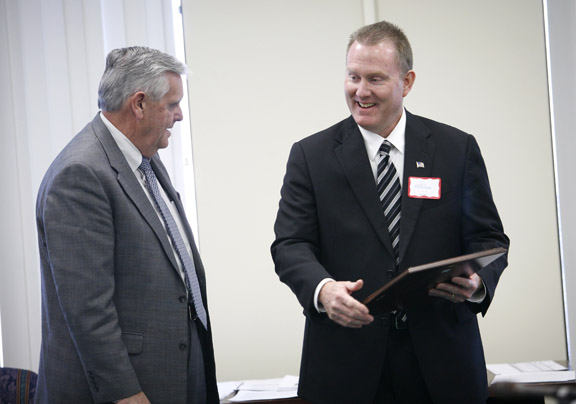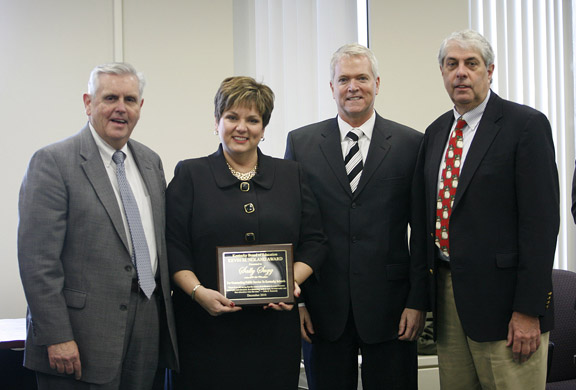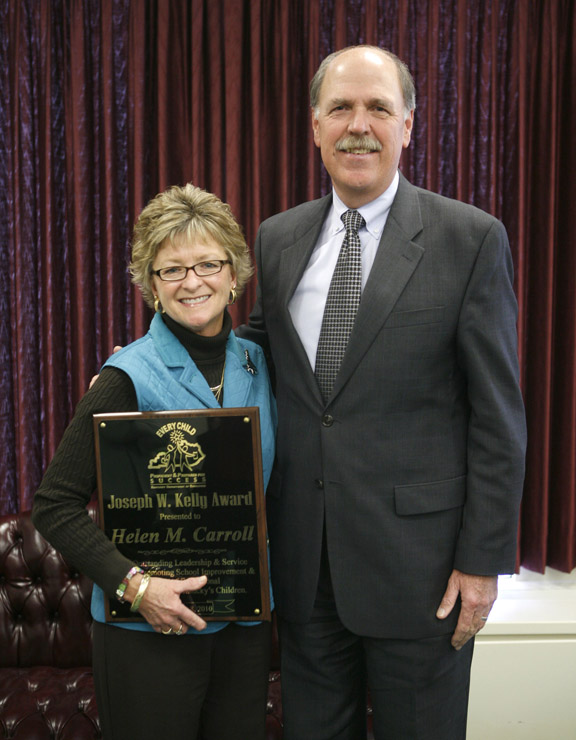
Superintendent Sam Sanders receives the Dr. Johnnie Grissom Award on behalf of the LaRue County School District from Commissioner of Education Terry Holliday during the Kentucky Board of Education meeting Dec. 8, 2010 in Frankfort, Ky. Photo by Amy Wallot
By Matthew Tungate
matthew.tungate@education.ky.gov
Kentucky’s new assessment and accountability system will drive schools and districts to improve to make sure students graduate college and career ready by validly measuring how students, schools and districts perform relative to their peers and reporting those results in specific and understandable ways.
Those are some of the goals and guiding principles of the new system, mandated by 2009’s Senate Bill 1 (SB 1), that members of the Kentucky Board of Education agreed on at their December meeting.
The board agreed to adopt a white paper called Goals and Guiding Principles for Accountability in Kentucky’s Public Education System.
Commissioner Terry Holliday said the paper is based on the national work of the Council of Chief State School Officers Accountability Task Force, which offers guidance to all states as they design state accountability systems.
“We’re not backing up,” he said. “We are increasing the rigor and expectation of children.”
The board agreed to make changes related to documenting how many students successfully transition to postsecondary education, workforce or military life; using international and national benchmarks; and reinforcing differentiated teaching and learning. The document will serve as a foundation on which decisions will be made regarding the new public school accountability model.
Once the board fleshes out assessment and accountability system, Kentucky will be the first state to implement an accountability model based on the goal of college and career readiness, Holliday said.
Holliday also said that after the new accountability model is approved, he will ask for a waiver of the federal No Child Left Behind (NCLB) Act to be replaced “with a more comprehensive system that measures college and career readiness.”
Holliday said that, in Kentucky, NCLB requires annual yearly progress (AYP) in reading and mathematics for up to 25 diverse groups. The most diverse schools are overanalyzed because they have the most goals, and schools that have less diversity are often overlooked, he said.
“The more goals you have, the more likely you are to not meet AYP,” Holliday said.
Because of that, NCLB gives failing marks to schools and districts that have 90-95 percent of students achieving proficiency but not making AYP in even one group. However, NCLB would not penalize a school district that has only 50 percent of students reading at proficient levels as long as students in minority groups showed improvement.
“So the AYP thing isn’t quite allowing us to get to the schools and districts that might be the lowest achieving,” he said.

Sally Sugg is presented with the Kevin M. Noland Award, second from right, by Commissioner of Education Terry Holliday, left, and Kentucky Board of Education David Karem during the Kentucky Board of Education meeting Dec. 8, 2010 in Frankfort, Ky. Photo by Amy Wallot
Under the new accountability system, African-American, Hispanic, Native American, special education, low income and limited English proficiency students would be combined as one group for calculation of the achievement gap and school gap reduction goal. However, scores for the various demographic groups would still be reported.
“It would hold all districts accountable for all children,” Holliday said.
The state’s proposed accountability system would encompass more than how students perform on tests, though. The proposed model incorporates all aspects of school and district work and includes measures of principal and teacher effectiveness and school and district support.
Associate Commissioner Ken Draut explained that the proposed accountability model offers a balanced approach organized around the board’s four strategic priorities of next-generation learners, professionals, support systems, and schools and districts. During the meeting, the focus was on the student-evaluation component of the proposed system.
Under the proposal, schools and districts would be designated as distinguished, proficient, needs improvement or persistently low-performing based on scores earned on various measures:
- Elementary and middle schools would earn points based on student achievement in reading, mathematics, science, social studies and writing; achievement gap reduction; and student growth in reading and mathematics.
- Middle schools also would earn points for students’ college readiness based on EXPLORE test results.
- High schools would earn points for student achievement as measured on end-of-course exams; PLAN and ACT scores; college- and career-readiness rate; and graduation rate. In addition, the department is investigating the use of PLAN and ACT to determine student growth at the high school level.
The proposed growth calculation is designed to measure a student’s growth in learning each year as compared to the student’s academic peers. So, higher-performing students’ scores are compared against other high-scoring students, while lower-performing students’ scores are compared against other lower-scoring students’ scores.
Under the achievement portion of the original plan, each student who scores proficient or distinguished earned one point. The board agreed that it did not want both proficient and distinguished students counted equally.
Holliday said “the field” proposed awarding points for each student who scores distinguished, while subtracting the same number of points for each novice. So, for instance, distinguished students might count for 1.5 points, while novice students would count for -0.5 points.
The board agreed with that idea.
Under the proposed model, high schools will be expected to meet annual targets based on how far they are from achieving a goal of a 90 percent graduation rate by 2015.
In addition to focusing on student performance, the accountability proposal also includes factors for teacher and school leader effectiveness, and the results of a working conditions survey and program reviews.

Helen Carroll is presented with the Joseph W. Kelly Award (pictured) during the Kentucky Board of Education meeting Dec. 8, 2010 in Frankfort, Ky.
Program reviews have been written for three areas: arts and humanities, practical living and career studies and writing. Rather than testing students to see what they have learned, schools gather evidence about how they integrated the subjects across their curricula and whether they provided students with opportunities to learn.
The board discussed adding a fourth program review in world languages, separating it from arts and humanities.
Several educators and parents from the Frankfort Independent school district appeared before the board to request that world languages be separated from arts and humanities and given its own program review.
Jocelyne Waddle, Frankfort High School (Frankfort Independent) teacher and president-elect of the Kentucky World Language Association, told the board that separating world language from arts and humanities is vital.
“We cannot be assessed in the same way,” she said.
Holliday reminded the board that program reviews require teachers to compile evidence throughout the year to evaluate their programs.
“Teachers are going to have to do this work,” he said.
Creating a separate program review “sounds good up here until you get to be a principal in a school, and you’ve got one art person, one band director and one PE teacher, and you give them this big ol’ clump of paper and you say, ‘Pull together all this evidence and make sure that it’s done,’” Holliday said.
“Program review work eventually becomes the work of every teacher and then the work of every teacher … will eventually be tied to teacher effectiveness and evaluation systems,” he continued.
Board member Dorrie Combs said she doesn’t think the board should be worried about that issue.
“I want to make sure that what we say to schools is, ‘You’ve got to be teaching world language,’” she said.
Holliday said he would bring feedback from educators back to the board in February, at which time it can decide whether to create a new program review for world languages.
The board will review the assessment and accountability system again at its February meeting.
The Kentucky Board of Education’s next regular meeting is scheduled for Feb. 1 in Frankfort.




[…] New accountability model begins to take shape (Dec. 2010 KBE meeting) […]